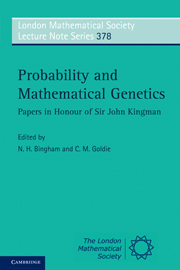Book contents
- Frontmatter
- Contents
- List of contributors
- Preface
- Bibliography of J. F. C. Kingman
- 1 A fragment of autobiography, 1957–1967
- 2 More uses of exchangeability: representations of complex random structures
- 3 Perfect simulation using dominated coupling from the past with application to area-interaction point processes and wavelet thresholding
- 4 Assessing molecular variability in cancer genomes
- 5 Branching out
- 6 Kingman, category and combinatorics
- 7 Long-range dependence in a Cox process directed by an alternating renewal process
- 8 Kernel methods and minimum contrast estimators for empirical deconvolution
- 9 The coalescent and its descendants
- 10 Kingman and mathematical population genetics
- 11 Characterizations of exchangeable partitions and random discrete distributions by deletion properties
- 12 Applying coupon-collecting theory to computer-aided assessments
- 13 Colouring and breaking sticks: random distributions and heterogeneous clustering
- 14 The associated random walk and martingales in random walks with stationary increments
- 15 Diffusion processes and coalescent trees
- 16 Three problems for the clairvoyant demon
- 17 Homogenization for advection-diffusion in a perforated domain
- 18 Heavy traffic on a controlled motorway
- 19 Coupling time distribution asymptotics for some couplings of the Lévy stochastic area
- 20 Queueing with neighbours
- 21 Optimal information feed
- 22 A dynamical-system picture of a simple branching-process phase transition
- Index
12 - Applying coupon-collecting theory to computer-aided assessments
Published online by Cambridge University Press: 07 September 2011
- Frontmatter
- Contents
- List of contributors
- Preface
- Bibliography of J. F. C. Kingman
- 1 A fragment of autobiography, 1957–1967
- 2 More uses of exchangeability: representations of complex random structures
- 3 Perfect simulation using dominated coupling from the past with application to area-interaction point processes and wavelet thresholding
- 4 Assessing molecular variability in cancer genomes
- 5 Branching out
- 6 Kingman, category and combinatorics
- 7 Long-range dependence in a Cox process directed by an alternating renewal process
- 8 Kernel methods and minimum contrast estimators for empirical deconvolution
- 9 The coalescent and its descendants
- 10 Kingman and mathematical population genetics
- 11 Characterizations of exchangeable partitions and random discrete distributions by deletion properties
- 12 Applying coupon-collecting theory to computer-aided assessments
- 13 Colouring and breaking sticks: random distributions and heterogeneous clustering
- 14 The associated random walk and martingales in random walks with stationary increments
- 15 Diffusion processes and coalescent trees
- 16 Three problems for the clairvoyant demon
- 17 Homogenization for advection-diffusion in a perforated domain
- 18 Heavy traffic on a controlled motorway
- 19 Coupling time distribution asymptotics for some couplings of the Lévy stochastic area
- 20 Queueing with neighbours
- 21 Optimal information feed
- 22 A dynamical-system picture of a simple branching-process phase transition
- Index
Summary
Abstract
Computer-based tests with randomly generated questions allow a large number of different tests to be generated. Given a fixed number of alternatives for each question, the number of tests that need to be generated before all possible questions have appeared is surprisingly low.
AMS subject classification (MSC2010) 60G70, 60K99
Introduction
The use of computer-based tests in which questions are randomly generated in some way provides a means whereby a large number of different tests can be generated; many universities currently use such tests as part of the student assessment process. In this paper we present findings that illustrate that, although the number of different possible tests is high and grows very rapidly as the number of alternatives for each question increases, the average number of tests that need to be generated before all possible questions have appeared at least once is surprisingly low. We presented preliminary findings along these lines in Cornish et al. (2006).
A computer-based test consists of q questions, each (independently) selected at random from a separate bank of a alternatives. Let Nq be the number of tests one needs to generate in order to see all the aq questions in the q question banks at least once. We are interested in how, for fixed a, the random variable Nq grows with the number of questions q in the test.
Information
- Type
- Chapter
- Information
- Probability and Mathematical GeneticsPapers in Honour of Sir John Kingman, pp. 299 - 318Publisher: Cambridge University PressPrint publication year: 2010
